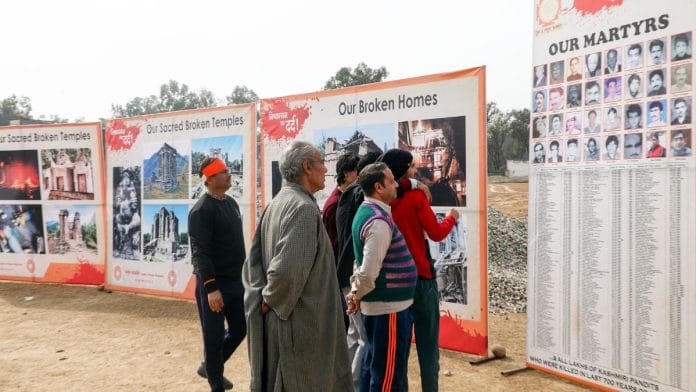New Delhi: Following the formation of an interfaith committee to facilitate the return and rehabilitation of Kashmiri Pandits in Kashmir, members of the community have stressed the need for open dialogue with stakeholders and a clear “blueprint” to guarantee their safe return and employment.
The committee, led by Hurriyat chairman Mirwaiz Umar Farooq, has outlined a six-point charter that advocates for the safe return of Kashmiri Pandits, addressing the concerns of minority communities, their economic development, and the preservation of Kashmir’s cultural heritage. Civil society group JK Peace Forum had announced its creation on 1 February.
However, the committee has drawn mixed reactions from the displaced Kashmiri Pandit community, with many questioning the legitimacy and inclusivity of the initiative. It was not clear who else was part of the community, according to them.
Mohit Bhan, a Kashmiri Pandit, called the formation of the panel a “welcome step” and said that when religious leaders come forward for such an initiative, it gives people confidence.
Bhan said that while all communities have a role to play in the rehabilitation process, it is the Indian government that needs to have a blueprint to make it possible.
“The rest of the groups can only be facilitators,” he said, adding that this might be a “golden opportunity” for the government to win the trust of Kashmiri Pandits.
The displacement of Kashmiri Pandits occurred in the early 1990s amid rising violence against the community during the Kashmir insurgency. They fled to various parts of India, primarily Delhi, Jammu, and other northern states. Multiple government efforts, including the establishment of satellite townships and economic packages, have attempted to rehabilitate them, though challenges remain in completing the process fully.
Also Read: Encroachment of temple properties ‘rampant’ in J&K, HC handed over 9 shrines to DMs in 2 months
‘Matter of dignity’
In 2008, the Indian government came up with an economic package for the rehabilitation and return of Kashmiri Pandits. This package included state government jobs, housing assistance, and financial aid for education and self-employment opportunities.
However, Bhan said that many of the Kashmiri Pandits who returned to Kashmir under the scheme did not get any accommodations. “The first batch of the people who returned are retiring next year, and they have still not been accommodated,” he said.
The biggest question is where will the Kashmiri Pandits, most of whom have sold their properties, go, he asked. “If there’s one cluster where you will rehabilitate them, how safe will that be? There is a need for inclusivity in terms of Kashmiri Muslims, Sikhs and Pandits living together so that they are not targeted again.”
Bhan also said that Kashmiri Pandits who left their “big homes” should be offered more than just one-bedroom apartments. “It is a matter of dignity for them,” he said, adding that the panel should also focus on how it can encourage Kashmiri Pandit youth, who have settled outside, to return to Kashmir.
Need for organic effort
At a closed-door meeting with Kashmir Pandits, held ahead of the formation of the committee, Mirwaiz expressed optimism about the move. However, several leaders of the community have even raised concerns about the composition of the delegation that met him and the effectiveness of such closed-door meetings.
Sanjay Sapru, who has raised the issues faced by his community, criticised the way the committee was formed, arguing that the process lacked representation from credible Kashmiri Pandit organisations.
“While this meeting was framed as an initiative to engage with the community, it involved a group that has little acceptance among Kashmiri Pandits. They do not represent our aspirations and sentiments. As a result, nothing concrete will come out of it,” he said.
Sapru emphasised the importance of broader consultations before taking any steps toward rehabilitation.
“Mirwaiz’s office knows who the key figures in the Kashmiri Pandit community are. If they genuinely wanted a meaningful dialogue, they should have reached out to organisations based in Jammu, Delhi, and Srinagar that have been working on this issue for years,” he added.
All India Kashmiri Samaj president Ravinder Pandita said that any serious rehabilitation effort must be rooted in the socio-political and economic realities of the community.
“For the past 36 years, we have seen multiple attempts at reconciliation, but none have yielded results because they fail to address the fundamental issues of political, social, and economic empowerment,” he said.
Pandita, who has been involved in heritage conservation and religious tourism initiatives across the Line of Control (LoC), stressed that the trust deficit between the displaced Pandits and the majority Muslims remains a major hurdle. “Now, the question is, how will the majority community end that trust deficit that happened in the gap of 36 years?”
He also pointed out that while some individuals have chosen to return and engage with their roots, the broader Pandit population remains sceptical. “We were forced out of our homeland. This is our seventh exodus. In the past, we have returned due to our cultural and historical ties to Kashmir, but this time, the challenges are greater,” he said.
Pandita said that there should be a formal appeal from the majority community expressing a genuine willingness to engage with them. “If they ask us to form a delegation and meet them [panel]. I will be the first person to meet. Otherwise, these closed-door meetings with 3-4 people will not work for the community of 5 lakh people spread across the globe.”
(Edited by Sanya Mathur)






